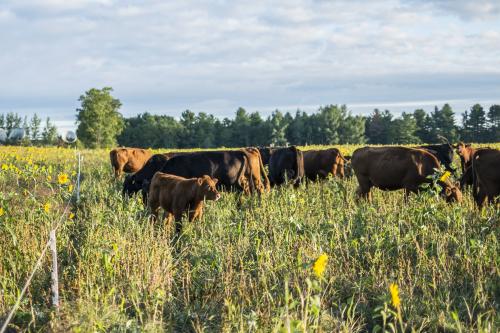Beefing up the region: MSU research to improve Midwest’s beef food systems
MSU AgBioResearch animal scientist Jason Rowntree has been awarded nearly $500,000 to improve the profitability of grass-finished beef producers in the upper Great Lakes region.

EAST LANSING, Mich. – Michigan State University (MSU) AgBioResearch animal scientist Jason Rowntree has been awarded nearly $500,000 by the U.S. Department of Agriculture (USDA) to improve the profitability of grass-finished beef producers in the upper Great Lakes region. The grant is one of four recently awarded to MSU to help small-scale agricultural producers build secure food systems.
“Michigan has a climate that is conducive to grass-finished beef production, but producers face two challenges: obtaining efficient weight gains in the last 60 days of finishing and supplying product for a majority of the year,” said Rowntree, MSU assistant professor of animal sciences.
His project will address these challenges by identifying economically feasible production strategies that are well-suited for producers in the upper Midwest. Rowntree said that he believes that forging relationships between processors and distributors is the key to meeting long-term retail supply needs, and he will use this project to refine a working model for building these partnerships.
For some producers, the absence of in-state processing facilities forces them to ship cattle hundreds – and in some cases thousands – of miles out-of-state. Rowntree cited a University of Kentucky study that showed that every $1 spent on beef cattle production returns $3.50 to the local community.
 “The longer producers keep beef cattle in their state, the more value it gives to their local economy, regardless if they are grass-fed or grain-fed,” he said. “Local packing and processing is the lifeblood of our communities, and if we don’t have them, we’re completely dependent on someone else to feed us.”
“The longer producers keep beef cattle in their state, the more value it gives to their local economy, regardless if they are grass-fed or grain-fed,” he said. “Local packing and processing is the lifeblood of our communities, and if we don’t have them, we’re completely dependent on someone else to feed us.”
Rowntree aims to develop a pasture-based, local food system that he refers to as a “pasture-to-plate” model. He will also assess consumer beliefs, attitudes and acceptance of beef derived from a local food system. According to a survey of 1,800 professional chefs conducted by the National Restaurant Association, locally sourced meat and seafood was the No.1 food trend in 2012. Rowntree hopes to understand more about consumers’ acceptance of grass-finished beef versus corn-fed beef. He will also identify the differences, if any, between fresh and frozen grass-finished beef.
“Improving the efficiency of grass-finished beef production and collaborating with local retail and culinary partners will enable small and mid-sized farms to improve their profitability and sustainability in addition to increasing the overall food security of the upper Midwest,” Rowntree concluded.
Rowntree will collaborate with five other MSU researchers on the project:
- Kimberly Cassida, MSU professor of plant, soil and microbial sciences.
- Janice Harte, MSU associate professor of food science and human nutrition.
- Matt Raven, MSU professor of community sustainability.
- Jeannine Schweihofer, MSU Extension educator.
- Sarah Wells, MSU meat science academic specialist.
His research is funded in part by MSU AgBioResearch and the MSU Center for Regional Food Systems.
The grant was awarded by the USDA National Institute of Food and Agriculture’s Agriculture and Food Research Initiative program, which supports projects that sustain and enhance agriculture-related activities in rural areas, protect the environment, enhance the quality of life and alleviate poverty.
MSU AgBioResearch engages in innovative, leading-edge research that combines scientific expertise with practical experience to generate economic prosperity, sustain natural resources, and enhance the quality of life in Michigan, the nation and the world. It encompasses the work of more than 300 scientists in six MSU colleges – Agriculture and Natural Resources, Communication Arts and Sciences, Engineering, Natural Science, Social Science and Veterinary Medicine – and has a network of 13 research centers across the state.



 Print
Print Email
Email




